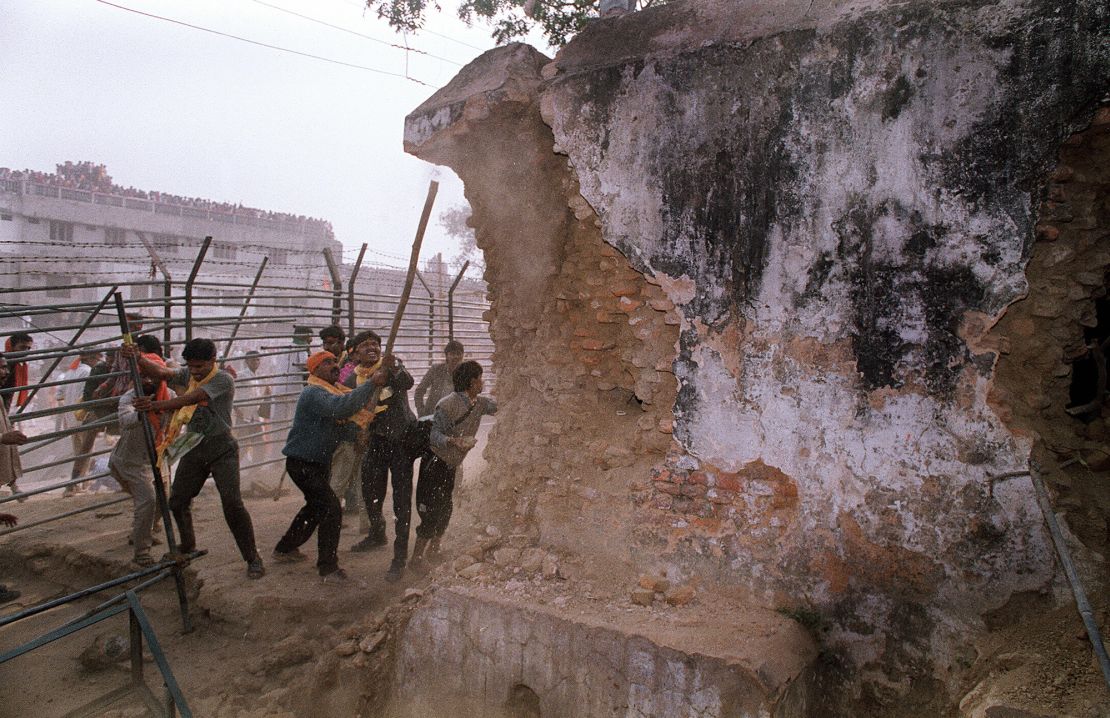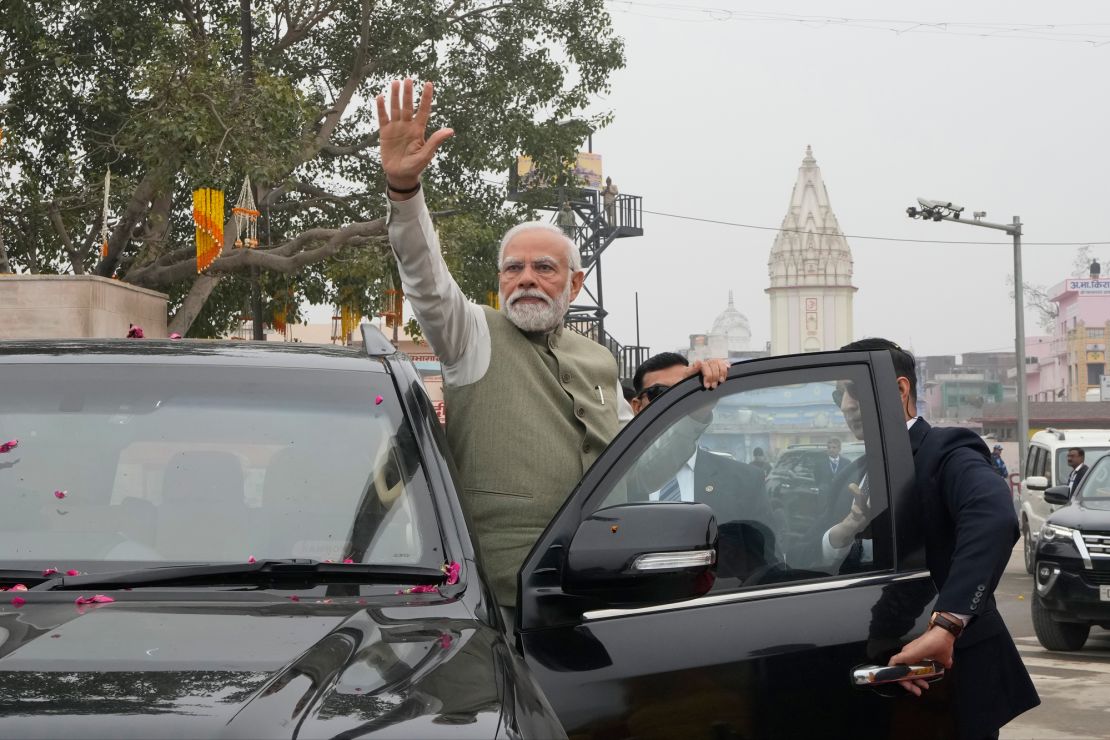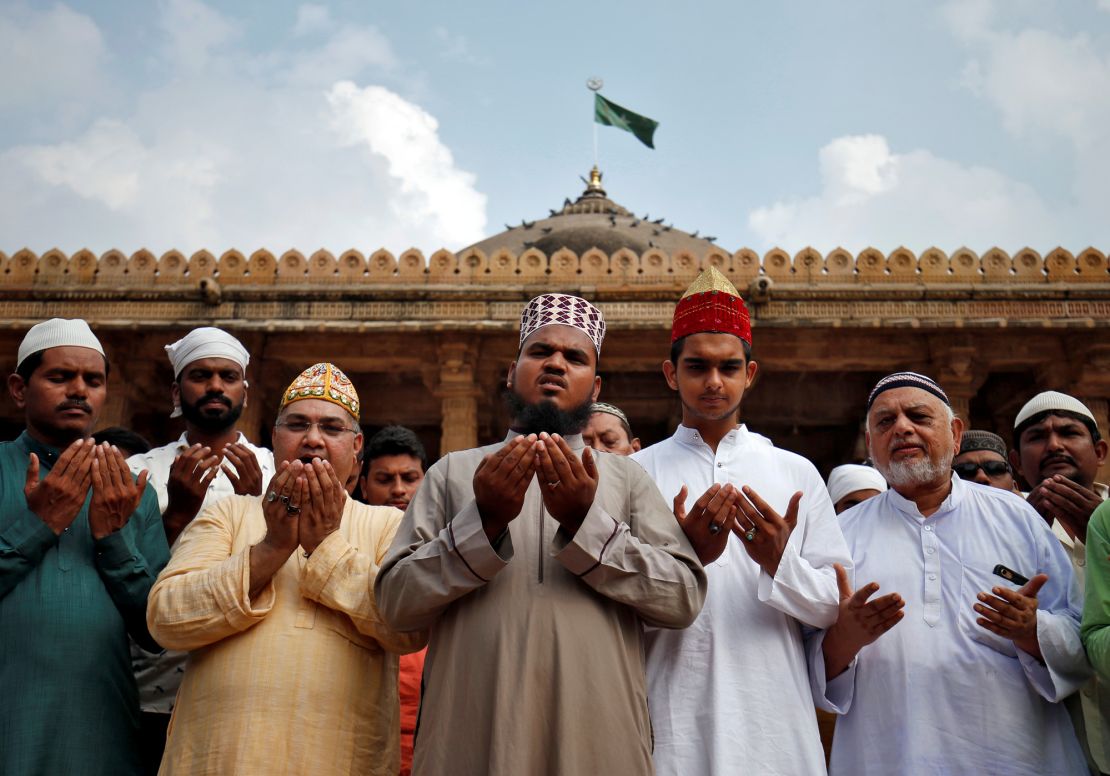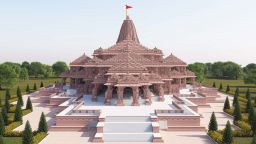A decades long Hindu nationalist dream is about to be achieved. What does this mean?
CNN January 19, 2024
Ornate gifts have started arriving in the Indian city of Ayodhya as the country’s Prime Minister Narendra Modi prepares to inaugurate a vast Hindu temple that he hopes will firm his chances for a rare third election win in just a few months’ time.
Though still not complete, the sprawling Ram Janmabhoomi Mandir fulfils a long-standing promise by Modi to build a Hindu temple on the site of a 16th century mosque that was destroyed by Hindu mobs more than 30 years ago.
That attack transformed India and turbo-charged the country’s Hindu nationalist movement.
For that reason, Monday’s ceremony is highly controversial, and while many Hindus will be celebrating its inauguration, for the country’s minority Muslim population, it’s a painful reminder of religious divisions they fear are becoming more pronounced under Modi’s Bharatiya Janata Party (BJP) government.
Here’s what you need to know.
What’s happening in Ayodhya on Monday?
An idol of Lord Ram, one of Hinduism’s most revered deities, will be unveiled inside the sanctum sanctorum of the temple, in a consecration ceremony conducted by Modi and broadcast to millions.
More than 7,000 people have been invited to attend the ceremony in person, including high-profile politicians who are flying in from across the vast country to take part.
Some 100 chartered planes are expected to land in Ayodhya on Monday, with hotel prices surging and last-minute bookings costing upwards of $1,200 per day, according to local media reports.
Since January 16, priests have been conducting prayers and performing rituals as workers move the idol into the temple’s complex. Senior leaders of the BJP have given numerous television interviews about the events, with Indian news channels running 24/7 coverage about the temple’s festivities.
The ceremony is also expected to be aired abroad in Indian embassies and on huge TV screens in New York’s Time Square.
Ahead of the event, Modi has been fasting and praying in an 11-day ritual steeped in Hindu religious symbolism.
“The Lord has made me an instrument to represent all the people of India during the consecration,” he said in a recorded message on his YouTube channel.
“I seek blessings from all of you,” Modi added.
Why is the Ram Mandir so controversial?
The site of the temple was once home to the Babri Masjid, a 16th century mosque, built during Mughal rule that ruled India from 1526 to 1858.
But many Hindus believe the Babri Masjid was built on the ruins of a Hindu temple, allegedly destroyed by Babar, the first Mughal emperor of South Asia.
The site is significant to them because they believe it’s the birthplace of Lord Ram, now honored with the construction of the new Ram Mandir.
Hindu nationalist groups had for years campaigned to demolish the mosque to build a temple in its place. In 1992, spurred on by the BJP and other right-wing groups, Hindu hardliners attacked it with hammers, triggering widespread communal violence.

Dozens of temples and mosques were also targeted in a series of revenge attacks that killed more than 2,000 people nationwide.
The violence was some of the worst seen in India since the bloody clashes that accompanied partition following independence in 1947.
In the following years, Hindu nationalists rallied to build the Ram Mandir on the site of the destroyed mosque, setting up an emotional and politically charged showdown that lasted decades.
In 2019, India’s Supreme Court granted Hindus permission to build the temple on the contested site, ending the dispute.
It was seen as a victory for Modi and his supporters but was a blow to many Muslims for whom the destruction of the Babri Masjid remains a source of deep tension and loss.
What is Modi’s involvement in the temple?
Modi rose to power in 2014 with a pledge to reform the country’s economy and usher in a new era of development – but throughout his political career he also heavily pushed a Hindutva agenda, an ideology that believes India should become a land for Hindus.
While in power, Modi’s party rallied to build the Ram Mandir in Ayodhya in another promise to his core voters, a move seen by many as favoring the country’s Hindu majority.
When the Supreme Court delivered its verdict four years ago, Modi said the decision had “brought a new dawn” for the nation and would lead to the “creation of a new India.”

Critics say Hindu nationalist politicians have torn India away from the secular founding principles and that the building of the temple in Ayodhya is the crowning achievement in their multi-decade campaign to transform the country.
The temple’s opening next week is widely expected to boost Modi’s chances of winning a rare third term in a general election expected later this year, having made true on his promise to millions of voters.
While the government hasn’t funded the construction of the temple, Modi and his BJP have heavily promoted its inauguration, with a colossal push to put it on par with a historic national event.
The BJP’s parent organization, the right-wing Rashtriya Swayamsevak Sangh, has distributed food to some 50 million families nearby, according to BJP officials, urging them to participate in the temple celebrations.
What are Muslims saying about the temple?
Muslims make up roughly 200 million of India’s 1.4 billion population. Ayodhya, located in the electorally significant northern state of Uttar Pradesh, is home to some 3 million people, including about 500,000 Muslims – and some of them are fearful of attacks on the day of the temple’s inauguration.
Many Muslims have shared messages of support to one another on social media, with WhatsApp messages urging the community to refrain from traveling on public trains and buses for their own safety.
The 2019 Supreme Court order that paved the way for the construction of the Ram temple also said authorities must set aside land for a mosque to be built about 25 kilometers (15 miles) away.

But construction of the mosque is not expected to begin until May.
Some prominent Muslim lawmakers have criticized the inauguration of the temple, lamenting the loss of the Babri mosque where their ancestors recited the Quran hundreds of years ago.
“Young people, we have lost our Masjid (mosque) and you are seeing what is being done there,” said Asaduddin Owaisi, chief of the All India Majlis-E-Ittehadul Muslimeen political party, to his followers during a speech earlier this month. “Don’t you have pain in your hearts?”
What is the opposition doing?
The BJP’s main opposition, the Indian National Congress, has announced it will boycott the inauguration, claiming the event is being politicized by the BJP.
Responding to the Congress’ decision to miss the ceremony, BJP spokesperson Sudhanshu Trivedi told reporters it was driven by “jealousy, malice and inferiority complex towards Prime Minister Narendra Modi,” adding that the party is opposing the “country” and “god.”
How much will the temple cost and what will it look like?
Indian engineering group Larsen and Toubro is constructing the temple within a 70-acre (28 hectares) complex, with the construction expected to cost about 15 billion rupees ($180 million).
The government has not provided funds for its establishment. Instead, donations of about 30 billion rupees ($361 million) have been collected for the complex.
Three sculptors carved murals of Lord Ram, one of which was picked by a panel to reside inside the sanctum sanctorum. The black stone sculpture weighs between 150 – 200 kgs (440 lbs) and depicts the deity as a five-year-old boy.

Geen opmerkingen:
Een reactie posten